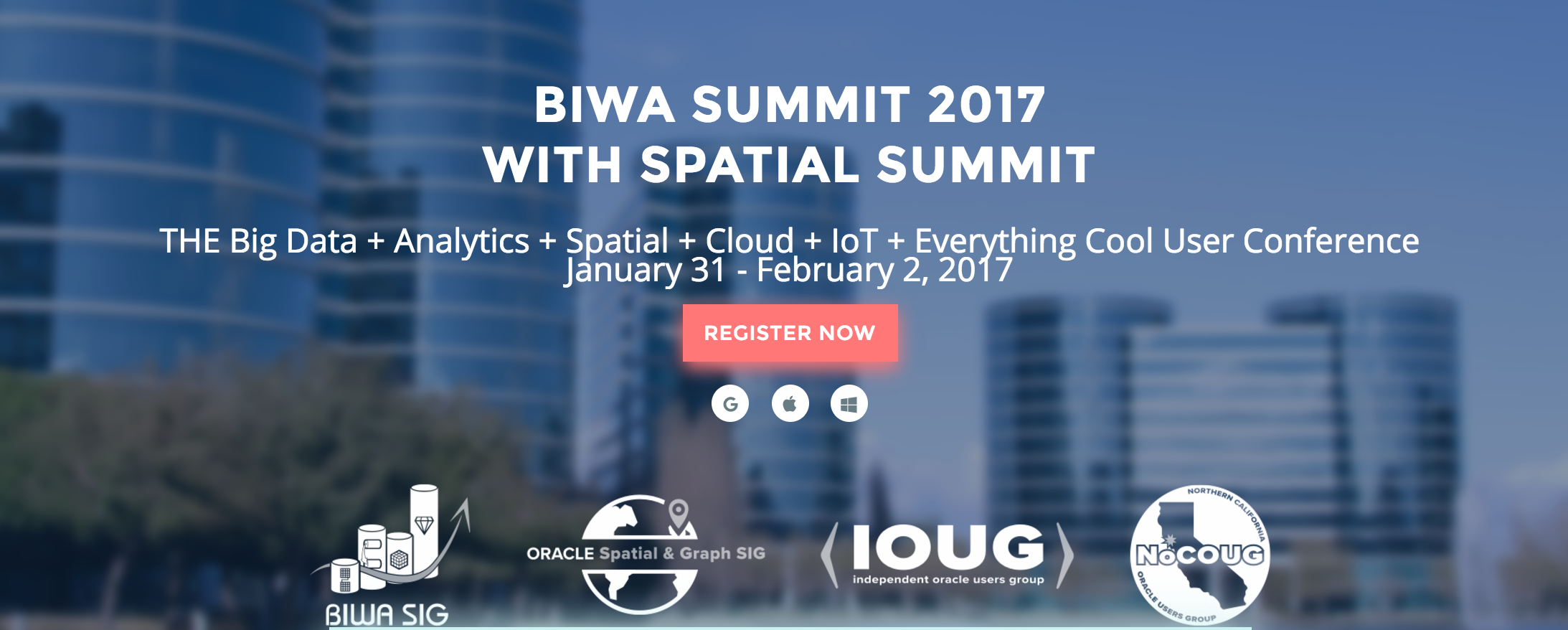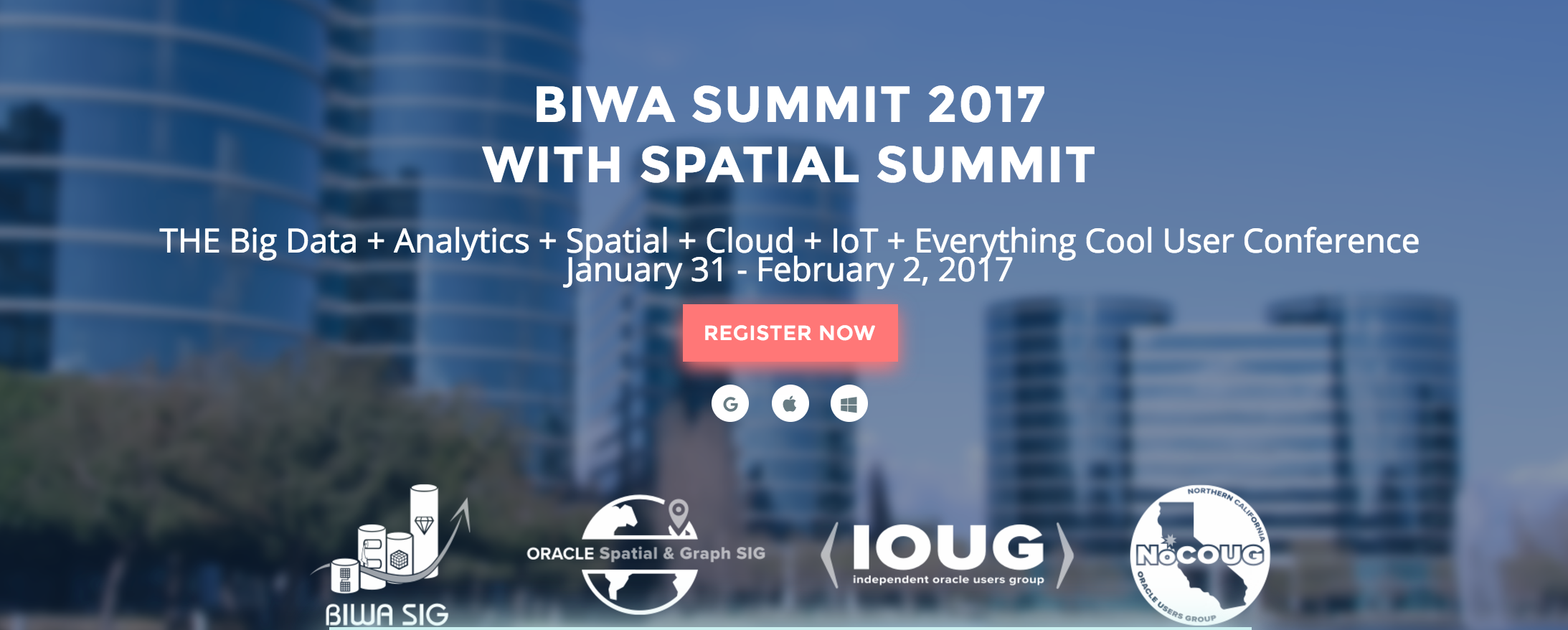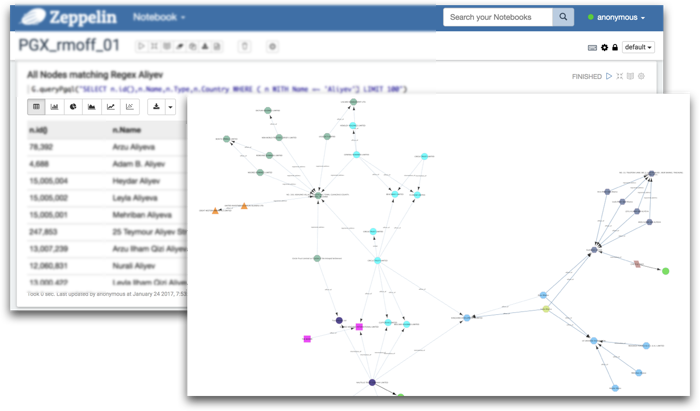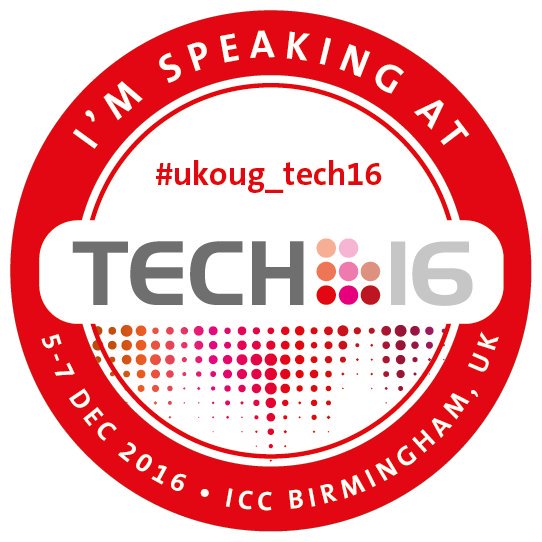Tag Archives: Conferences
Rittman Mead sponsoring RMOUG

After enjoying a successful 2020 in the North American data and analytics market, we’re excited to announce that we’re sponsoring Rocky Mountain Oracle Users Group (RMOUG) this year!
Running from 8th - 11th February, the agenda is jam packed with content including interactive workshops and technical sessions all presented by local and international Oracle product managers, partners and end users. There’ll be plenty of content covering everything from the newest developments in Oracle Analytics to database migrations. You can catch our CEO, Jon Mead at 11.30am (MST) on the 11th where he’ll be exploring how metadata can help you to understand and enhance user engagement. Don’t miss it!

We’ll be hosting a couple of break-out sessions (bring your own coffee) so if you want to chat Oracle Analytics, AI, ML, databases or anything in between then please feel free to virtually drop by and have a chat with one of the team.
Register here: https://events.bizzabo.com/TD2021/page/1611456/registration
Join Rittman Mead at the 2017 BIWA Summit!

We invite you to come join us at the annual 2017 BIWA Summit.

This year we are proud to announce that Robin Moffatt, Head of Research and Development, will be presenting on:
Analysing the Panama Papers with Oracle Big Data Spatial and Graph
January 31, 2017 | 3:45 pm – 4:15 pm | Room 103
Oracle Big Data Spatial and Graph enables the analysis of datasets beyond that of standard relational analytics commonly used. Through Graph technology relationships can be identified that may not otherwise have been. This has practical uses including in product recommendations, social network analysis, and fraud detection. In this presentation we will see a practical demonstration of Oracle Big Data Spatial and Graph to load and analyse the “Panama Papers” dataset. Graph algorithms will be utilised to identify key actors and organisations within the data, and patterns of relationships shown. This practical example of using the tool will give attendees a clear idea of the functionality of the tool and how it could be used within their own organisation. If Oracle Database 12cR2 on-premise is available by the time of this presentation, then its new property graph capabilities will also be covered here. The presentation will be based on a paper published on OTN: https://community.oracle.com/docs/DOC-1006400
Kafka’s Role in Implementing Oracle’s Big Data Reference Architecture on the Big Data Appliance
February 1, 2017 | 2:20 pm – 3:10 pm | Room 102
Big Data … Big Mess? Everyone wants Big Data, but without a good platform design up front there is the risk of a mess of point-to-point feeds. The solution to this is Apache Kafka, which enables stream or batch consumption of the data by multiple consumers. Implemented as part of Oracle’s Big Data Architecture on the Big Data Appliance, it acts as a data bus for the enterprise to both the data reservoir and discovery lab. This presentation will introduce the basics of Kafka, and explain how it fits within the Big Data Architecture. We’ll then see it used with Oracle GoldenGate to stream data into the data reservoir, as well as ad hoc population of discovery lab environments and microservices such as Flume, HBase, and Elasticsearch.
(Still) No Silver Bullets: OBIEE 12c Performance in the Real World
February 2, 2017 | 1:30 pm – 2:20 pm | Room 203
Are you involved in the design and development of OBIEE systems and want to know the best way to go about ensuring good performance? Maybe you’ve an existing OBIEE system with performance “challenges” that you need to diagnose? This presentation looks at the practical elements of diagnosing the causes of performance issues in OBIEE, and discusses good practices to observe when developing new systems. It includes discussion of OBIEE 12c and with additional emphasis on analysis of Usage Tracking data for the accurate profiling and diagnosis of issues. Why this would appeal to the audience: – Method-R time profiling technique applied to the OBIEE nqquery.log – Large number of the community use OBIEE, many will have their own performance horror stories; fewer will have done a deep dive into analysing the time profile of long-running requests – Performance “right practices” will help those less familiar with performant OBIEE designs, and may prompt debate from those more experienced. As presented previously at OOW, OUGF, UKOUG, OUG Scotland, and POUG. Newly updated for OBIEE 12c. * Video: http://ritt.md/silver-bullets-video* Slides: http://ritt.md/silver-bullets-slides
Rittman Mead at BIWA Summit 2017
I'm excited to be attending my first ever BIWA Summit next week (which will take me to Oracle HQ at Redwood Shores for the first time too!). This three day conference is one of the major dates in the conference calendar for all Oracle Analytics folk, and I'm proud to have opportunity to present three papers:
Analysing the Panama Papers with Oracle Big Data Spatial and Graph
31st January, Room 103, 15:45
Based on an article I wrote recently, I'll be talking about how to use property graph analysis through Oracle's Big Data Spatial and Graph tool to examine and analyse the relationships in the Panama Papers dataset. Complex relationships that would be all but impossible to query in relational SQL can be uncovered using built in algorithms as well as with Property Graph Query Language (PGQL). I'm using my new favourite tool, interactive notebooks, to demonstrate PGQL as well as the PGX interface.

Kafka's Role in Implementing Oracle's Big Data Reference Architecture on the Big Data Appliance
1st February, Room 102, 14:20
Apache Kafka is rapidly becoming accepted as a de-facto means of building a data pipeline through a business, ensuring availability of data to and from all systems that need it. In this presentation I go in to the detail of what Apache Kafka is, the problems that it solves - and then put this in context of the Oracle Information Management and Big Data Reference Architecture.
(Still) No Silver Bullets : OBIEE 12c Performance in the Real World
2nd February, Room 203, 13:30
One of my favourite presentations to deliver, this dives into what you should - and shouldn't - do when building an OBIEE system. It explains how to troubleshoot performance issues methodically - and not a best practice in sight!
There's a full listing of all sessions here, with a PDF to download here.
You can follow the conference proceedings on twitter with the hashtag #BIWASummit, and I'll be tweeting about it to as @rmoff. The presentations that I'm delivering will be available to download on speakerdeck.
Rittman Mead at UKOUG Tech 16

This year as always Rittman Mead is coming to UKOUG Tech 16 with a strong presence and a great line up of sessions covering OBIEE, ODI, Kafka, advanced visualisation and more. And yes, there will be Cloud!

Here is the details of the Rittman Mead sessions :
- Kafka's Role in Implementing Oracle's Big Data Reference Architecture on the Big Data Appliance – Monday 13.10, Exec Room 5 [Robin Moffatt]
- Source Control, Code Deployment & Concurrent Development for OBIEE 12c – Monday 17.55, Hall 6A [Robin Moffatt]
- Business Analytics Stream Roundtable, chaired by Mike Vickers – Tuesday 09.00, Hall 1 Foyer Level 5
- Still No Silver Bullets : OBIEE 12c Performance in the Real World – Tuesday 11.35, Exec Room 6 [Robin Moffatt]
- Bridging the Gap: Enhancing OBIEE with a Custom Visualisation Platform – Tuesday 14.25, Exec Room 6 [Minesh Patel]
- On-Premise to Cloud Using Oracle Data Integrator to Load BICS – Tuesday 15.25, Hall 6A [Jerome Francoisse]
- Reduce European Flight Delay – Real Time ODI, OBIEE & D3 – Wednesday 10.00, Hall 6B [Jerome Francoisse]
- OBIEE 12c Upgrade Experience at Liberty Global Case Study – Wednesday 14.10, Hall 6B [Francesco Tisiot]
There is no better way to finish a conference than with two success stories from our recent engagements! If the OBIEE 12c upgrade depicted in Francesco's session is something you are also looking to achieve, we would be pleased to tell you more about it and to see how we can help you.
And of course, we are also happy to answer any questions if you see us in sessions or around the conference. You can find some of us during the Oracle Big Data meetup (Monday evening) or the ODTUG Data and Analytics Switzerland meetup (Tuesday evening).
So see you in two weeks in Birmingham !
POUG
I've just attended my first user group in Poland, the very-excellent POUG. This was the first international version of the conference, having been run previously just within Poland. Based on these two days, I would say it was a resounding success! There was a great atmosphere there, really engaged and enthusiastic. The size of the event, friendliness, and fun made it a very welcoming one, and reminded me a lot of my first ever conference that I attended (back in 2010!), the Rittman Mead BI Forum.
I travelled out to Warsaw on the Thursday, and attended the speakers dinner. It's always nice to see familiar faces and meet new ones - as well as enjoy some jolly good food. The next morning I went for a run at the nearby park, enjoying the sunrise over the water
Good morning Warsaw! #POUG https://t.co/aHAuYonlhE pic.twitter.com/LYgU50bIei
— Robin Moffatt (@rmoff) October 7, 2016
The conference had two tracks, focussing primarily on the database but with some BI content too, as well a talk about property graphs. The first session I attended was also one of my favourites. It was "DBA, Heal Thyself: Five Diseases of IT Organizations and How to Cure Them", presented with great humour and energy by Jim Czuprynski. Some of the uncomfortable truths about mistakes made in the field of IT were laid bare, with no prisoners taken! Whilst it was based on the database, much of it was applicable to OBIEE. Things like reliance on bespoke scripts, avoidance of new features, and general ignorance in the field were covered. You can find an article on the topic from Jim here.
After Jim's session was Hans Viehmann talking about Property Graphs. I wrote an article that was published on OTN just last week about this and it was great to get chance to meet Hans, and hear him speak.
I skipped the next session to do a bit of slide polishing and geek chat with Christian Berg, before getting lunch - which was really good:
Just a light lunch at #POUG pic.twitter.com/B3Bntf1JCU
— Robin Moffatt (@rmoff) October 7, 2016
After lunch was OBIEE presentations in both tracks, by Christian Berg, and Kiran Taylor. I sat in on Christian's "Fifty shades of #fail", which is a fun walk through some of the many ways that OBIEE gets done wrong.
My talk, "(Still) No Silver Bullets - OBIEE 12c Performance in the Real World" was the last of the day. I've given this talk quite a few times now, but still enjoy delivering it each time. The topic's one I've spent so much time working on and find so interesting, that it never gets stale! You can find the slides here and set of related links here.
.@rmoff - OBIEE performance in the real world - where is it slow? - #POUG pic.twitter.com/IanRoHBX2G
— Kiran Tailor (@KiranTailorUK) October 7, 2016
The day finished with the POUG After Party, which was at a bar in the center of Warsaw. Good beer, good food, good music - and plenty of geek talk! I really have to take my hat off to the organisers of POUG, they did a great job.
#POUG #bagpipes pic.twitter.com/ZC8WGwq8Z6
— Robin Moffatt (@rmoff) October 7, 2016
The second day of POUG brought more good presentations. I got to see Neil Chandler speak, about execution plans and how they can vary - and how to ensure they don't unless you want them too. It was really interesting, and took me back a few years to when I last looked in-depth at this kind of stuff. After Neil was Jim again, talking about analytic functions. Most of these I knew about, but one that was new to me (and I'll definitely be using) was the PERCENT syntax for FETCH FIRST - very neat.
Great stuff from @JimTheWhyGuy at #POUG. FETCH FIRST I knew… but now I know you can use PERCENT with it too. Cool! pic.twitter.com/f10yoz8yge
— Robin Moffatt (@rmoff) October 8, 2016
The audience at POUG seemed to be predominantly DBAs and database developers, and this kind of talk is just great for spreading awareness of new functionality that is going to make people's jobs easier, and their code run faster. The final talk of the morning was from Martin Widlake, presenting a great discussion about efficient and maintainable bulk processing with SQL and PL/SQL. With his very accessible and engaging presentation style, Martin's talk was an extremely pragmatic and valuable one. Everyone loves a deep-dive geekout on system internals (don't they??), but arguably the most value to the widest section of the audience comes in learning, or being reminded of, how to code and design systems well.
Even without lots of BI content, I found the conference very useful. Whilst Oracle CBO internals may not be my day to day work, many of the topics discussed in a database context can easily be transplanted to the BI world. Performance is performance. Diagnostic approaches are tool-agnostic. As well as the presentations, the opportunity to exchange ideas and war-stories with other experts in the industry (over a beer, usually…) is the kind of thing you just don't get from reading the manuals or a bunch of PDFs.
So that was POUG, and all too soon time return home. Bravo to the organisers of POUG, and here's hoping they run the conference again next year!
Well that was it for #poug. So long @POUG_ORG and thanks for all the fish! pic.twitter.com/mv9Es95yfr
— Christian Berg (@Nephentur) October 8, 2016


